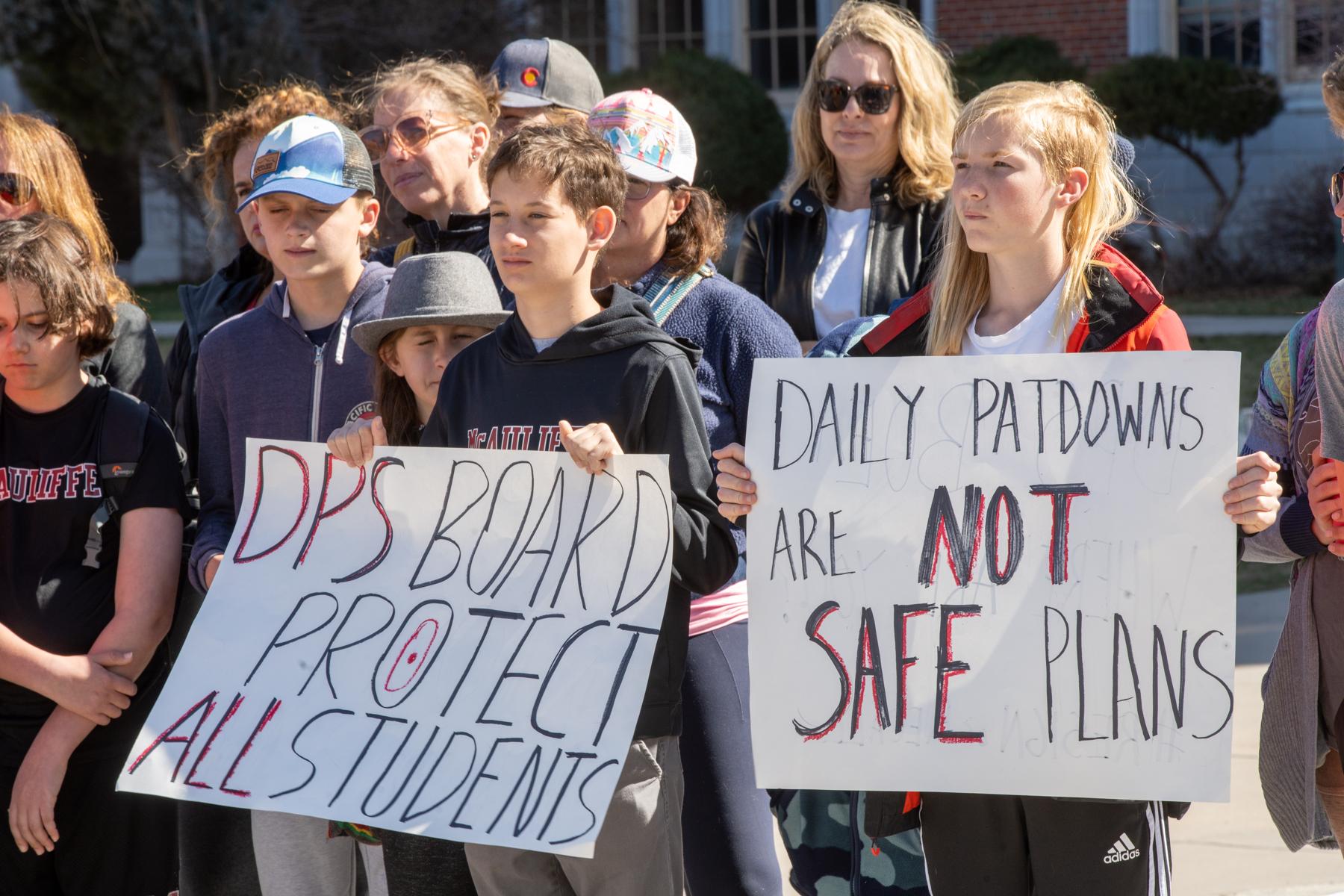This story was originally published by Chalkbeat. Sign up for their newsletters at ckbe.at/newsletters.
By Melanie Asmar and Erica Meltzer/Chalkbeat Colorado
The second draft of Denver Public Schools' new safety plan doesn't answer a key question -- whether Denver schools will station armed police officers on campus next school year.
While the first draft suggested that school principals would have the authority to decide for themselves, the second draft released Friday kicks that question back to the school board, which still hasn't voted on whether to permanently end a ban on school resource officers enacted in 2020.
Superintendent Alex Marrero now recommends the board decide for all comprehensive high schools and all 6-12 schools. The board is scheduled to discuss police in schools next week.
School principals would be able to decide whether to install metal detectors or other weapons detection systems after "extensive community engagement," according to Marrero's plan.
The plan reiterates that every student has the right under federal law to access a free and appropriate public education -- a response to those in the community who said students with a history of concerning behavior should be required to attend alternative schools or online school. However, the plan also says the district is expanding hybrid and online options.
The plan does not recommend specific changes to the discipline matrix -- another source of concern for some educators and parents who feel the district has gone too far in keeping certain students in school -- but mentions that Denver Public Schools leadership will work with a team from Harvard and large urban school districts on effective discipline strategies.
The board directed Marrero to draft a long-term safety plan one day after a student shot two deans at Denver's East High School in March. Marrero released a first draft of the plan on May 1. He has until June 30 to finalize it.
Whether police officers should be stationed on DPS campuses is among the most hotly debated aspects of the plan. The school board had removed officers -- known as school resource officers, or SROs -- from schools in 2020 following the murder of George Floyd in Minneapolis. But after the East High shooting, the board held a lengthy closed-door meeting and temporarily suspended its ban on police.
Thirteen Denver high school campuses now have SROs. But the temporary suspension is set to expire next month.
The topic was on the agenda at the board's May 18 meeting. However, after voting to give Marrero a 10% raise, the board ran out of time to discuss the SRO policy.
Board President Xóchitl "Sochi" Gaytán said Friday that the board is set to discuss the policy, known officially as executive limitation 10.10, at a work session Thursday. The board could vote later in June, Gaytán said. Currently, the policy says the superintendent shall "not staff district schools with school resource officers or the consistent presence of security armed with guns or any other law enforcement personnel."
Opinions vary on whether schools should have SROs. In a survey conducted last month, 33% of DPS staff, 41% of students, and 48% of parents who responded said SROs would help. White parents were overrepresented among the respondents.
The draft plan says a majority of Denver school principals want to host school resource officers at their schools but also want the school board to make the decision, rather than make the decision themselves. In contrast, classroom teachers are less likely to support having school resource officers on campus but want the decision made at the school level.
Should the school board decide to keep police on campuses, the plan says the district would work closely with the department on selecting and training officers.
DPS held four telephone town hall meetings about the first draft of the safety plan. Marrero briefly discussed the feedback at the May 18 school board meeting.
He said more than 24,000 people attended the telephone meetings, and participants ranked SROs and weapons detection systems as the top two systemwide strategies in which the district should invest more resources. The other choices included unarmed and armed DPS security guards, communications, student discipline, and out-of-school programming.
A high-level summary of the townhall feedback included in the new safety plan shows a majority of participants did not feel the proposed strategies addressed student safety very well, not at a personal level, a school level, or a district level.
At 48 pages long, the first draft of the safety plan largely repeated things DPS already does or policies it already has in place. For instance, it talked about expecting schools to have the equivalent of one-full time mental health worker on staff and highlighted 20-minute daily lessons on social and emotional learning that happen in elementary schools.
The first draft also detailed DPS's existing summer school programs, its commitment to culturally relevant curriculum, and its bullying prevention efforts.
The second draft is 62 pages and very similar to the first. The executive summary says in response to feedback, the district made an effort in the second version to better distinguish between programs that are already in place and those that are planned for future years.
The plan rejects the idea of requiring clear backpacks as unlikely to be effective and says that small class sizes -- a top priority of the teachers union -- do "not address all aspects of school safety."
The draft plan doesn't include any cost estimates yet but promises that the final version will.
Melanie Asmar is a senior reporter for Chalkbeat Colorado, covering Denver Public Schools. Contact Melanie at [email protected].
Bureau Chief Erica Meltzer covers education policy and politics and oversees Chalkbeat Colorado's education coverage. Contact Erica at [email protected].












